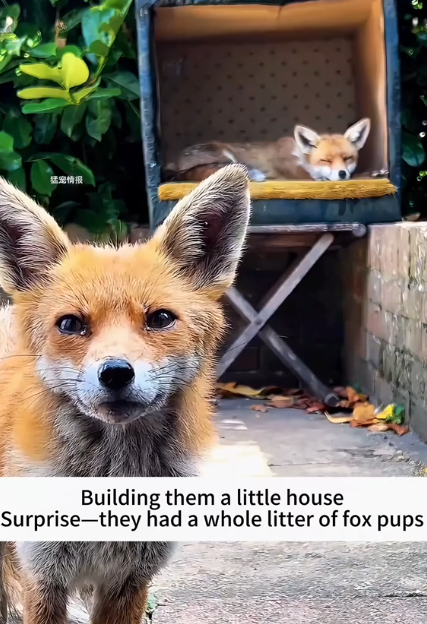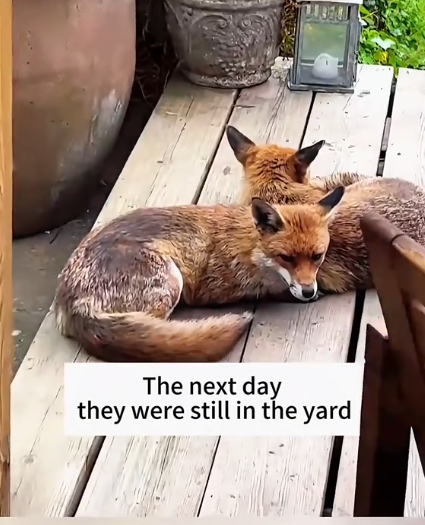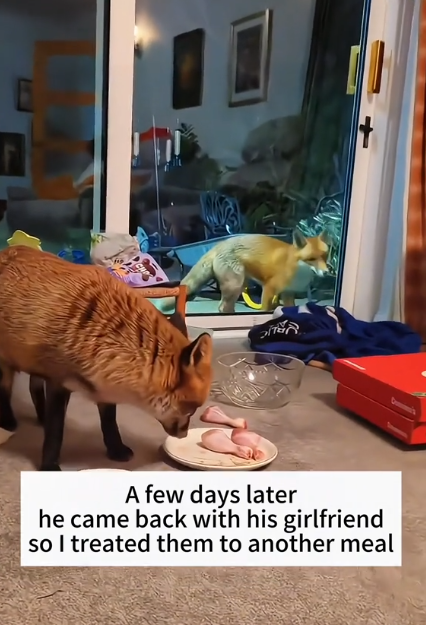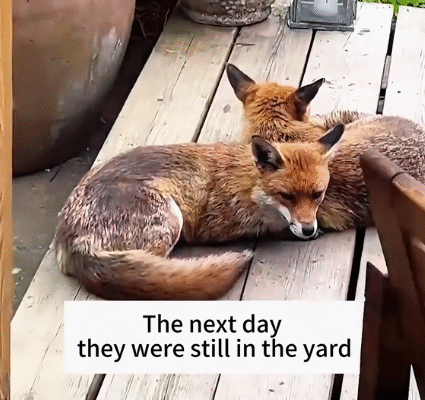
It all began on a quiet spring afternoon in our sleepy countryside village. The sun was warm, the breeze gentle, and the world seemed at peace. My father, a man of quiet kindness and deep compassion for animals, had gone down to the riverbank for his usual afternoon walk when fate intervened in the most unexpected way.
As he strolled along the river, taking in the scenery, he heard a faint yelp. At first, he thought it was just a bird or some other woodland creature, but as the sound grew more desperate, he hurried toward it. That’s when he saw the small, soaked body of a fox cub, struggling against the current. The poor thing had likely fallen in while trying to follow its mother. Its tiny legs paddled frantically, but it was losing strength quickly.
Without hesitation, my father leapt into the shallow river, fully clothed, and waded over to the cub. The water was icy, but that didn’t matter to him. He scooped the fragile creature into his arms and carried it to the shore, wrapping it in his jacket. I still remember him returning home that evening, soaked from head to toe, with this shivering little fox cradled in his arms like a newborn baby.
I was about fourteen at the time and immediately fascinated. The fox cub, though scared, didn’t try to run. It was weak and cold, its reddish fur matted and dirty. We named it “Roo,” short for River, since that’s where it had come from. Roo was taken in, fed warm milk, and made comfortable in a soft box near our woodstove.
For the first few days, Roo was too tired to do much of anything. My father stayed by its side, tending to its needs with the same care he gave to all living things. I helped when I could—feeding it tiny portions, cleaning its fur with a damp cloth, even talking to it softly. Slowly, Roo began to trust us. And slowly, I began to fall in love with that fox cub.
Weeks passed, and Roo grew stronger. She started to follow me around the yard, her bright eyes watching my every move. She’d tug at my shoelaces, chase butterflies, and curl up on the porch when I sat reading. My father insisted she would eventually have to go back to the wild, but I secretly hoped she would stay forever. She had become my best friend.

Then, one day, it happened. Roo vanished. Just like that.
I woke up and went outside as usual to feed her, only to find her corner empty. We searched the woods, called her name, and even left food near the edge of the forest. But Roo was gone. I was heartbroken. My father told me it was for the best—that Roo had returned to her natural world, and that’s where she truly belonged. I nodded, but I missed her terribly.
The years went by. I grew up, went to college in the city, and eventually started my own life. The fox became a sweet memory, tucked away like an old photograph in my mind. But I never forgot her, and I never stopped wondering what happened to her.
Fast forward nearly ten years.
I was back in the village to visit my parents. They were older now, especially my father, who walked a little slower and didn’t go to the river as often. One afternoon, I went for a walk alone, retracing the path my father used to take. The river looked just the same, peaceful and shining in the late afternoon sun.
As I stood by the bank, lost in thought, I heard a rustle in the underbrush behind me. I turned around—and froze. Standing just a few feet away was a fox. She was large, healthy, her reddish coat glowing in the light. She stared at me with intense, familiar eyes. There was something different about this fox. She didn’t seem afraid. In fact, she tilted her head slightly, just the way Roo used to when I spoke to her.
Could it be?
Before I could take a step, she turned and darted into the trees. I followed, not out of fear or danger, but a strange pull—like I was meant to. After about ten minutes of winding through the forest, I came upon a small den dug into the hillside. Inside were three tiny fox kits, their eyes still blue and curious.
The mother fox stood nearby, watching me.
I didn’t go closer. I knew better than to approach wild babies. But I stood there, stunned. I whispered, “Roo?” and for a moment, she flicked her tail and let out a low, friendly bark—before turning and disappearing into the woods again.
Tears welled in my eyes.
That night, I told my father everything. He listened silently, a smile slowly spreading across his weathered face.
“She came back to show you,” he said simply. “To show you her family. To show you that she remembered.”
From that day on, I visited the forest often. I never tried to interfere, but Roo would sometimes appear, always from a distance, always watching. And on a few rare occasions, she brought her kits close enough to see me. I could hardly believe it—how a simple act of kindness from my father so many years ago had blossomed into this quiet, magical bond between species.

Roo never lived with us again. She was wild and free. But she remained a part of my life, quietly, from the edges of the forest. In the fall, I’d find little “gifts” on the porch—an autumn leaf, a smooth stone, a feather. I liked to think they were from her, small tokens of gratitude.
My father passed away a few years later. On the day of his funeral, as we gathered to say goodbye, I stepped out for air and walked toward the edge of the trees. There, under the shade of an old oak, Roo sat silently, watching. She didn’t move, didn’t flee. Just watched.
And I knew in my heart she was saying goodbye too.
To this day, whenever I hear the rustle of leaves or catch sight of a flash of red in the woods, I think of Roo. Of how my father’s small act of rescue rippled through time, creating an unlikely friendship, a bond that defied nature’s rules. And I remember that sometimes, the kindness we offer the world returns to us in the most beautiful, unexpected ways.



